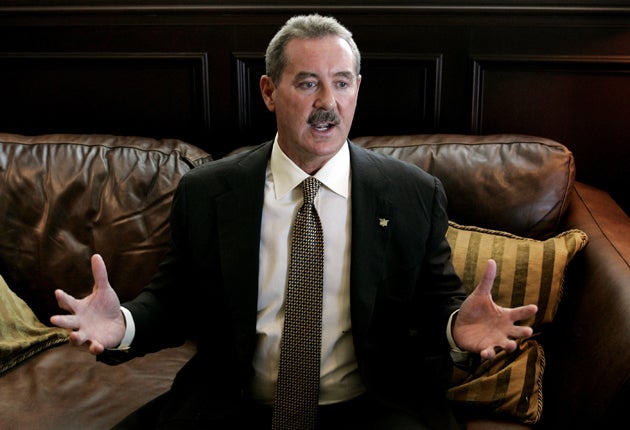Stanford faces years in jail over '$7.2bn pyramid fraud'
Criminal charges brought against Texan billionaire and alleged partners in crime

Your support helps us to tell the story
From reproductive rights to climate change to Big Tech, The Independent is on the ground when the story is developing. Whether it's investigating the financials of Elon Musk's pro-Trump PAC or producing our latest documentary, 'The A Word', which shines a light on the American women fighting for reproductive rights, we know how important it is to parse out the facts from the messaging.
At such a critical moment in US history, we need reporters on the ground. Your donation allows us to keep sending journalists to speak to both sides of the story.
The Independent is trusted by Americans across the entire political spectrum. And unlike many other quality news outlets, we choose not to lock Americans out of our reporting and analysis with paywalls. We believe quality journalism should be available to everyone, paid for by those who can afford it.
Your support makes all the difference.Allen Stanford, the flamboyant Texan billionaire who promised to bankroll English cricket, was in custody last night after prosecutors said his offshore banking business was a massive fraud.
In US criminal charges that go far beyond the accusations already levelled against him in a civil case, Mr Stanford is accused of being in cahoots with the Antiguan authorities by bribing the Caribbean island's chief regulator to help hush up his $7.2bn (£4.3bn) pyramid scheme when the authorities began to close in. The depth of the apparent conspiracy and the number of his alleged crimes emerged only after his long-time business partner and former college room-mate turned against him, striking a co-operation agreement with the FBI.
The Antiguan regulator, Leroy King, and four employees of the Stanford financial empire were charged yesterday with aiding the billionaire, one of them by agreeing to lie to investigators and another by shredding vital financial documents.
Mr Stanford was arrested late on Thursday at the home of his fiancée, Andrea Stoelker, in Virginia, where the couple say they have been living on the charity of her family since the US Securities and Exchange Commission (SEC) shut down his business in February, serving a civil lawsuit for fraud and persuading a court to freeze his bank accounts. FBI officers pulled up to the Stoelker family home in the sleepy commuter town of Fredericksburg in black SUVs and called at the door to arrest Mr Stanford. Since then he has protested his innocence, saying that if there was any wrongdoing it could only have been perpetrated by his underlings.
He was led into court yesterday in Richmond, Virginia, wearing leg irons, where Judge Hannah Lauck agreed with prosecutors that he posed a flight risk and ordered him to be held until a hearing can be arranged in Houston, Texas, to decide whether he will be detained without bail.
Mr Stanford's lawyer, Christina Sarchio, opposed the hearing and said that Mr Stanford "is confident that a fair jury will find him not guilty of any criminal wrongdoing".
"To the contrary, the present insolvency of the Stanford companies was caused by the SEC's heavy-handed actions," she added. The three senior Stanford executives named alongside their boss in the criminal indictment include Laura Pendergest-Holt, his chief investment officer.
The charges call into question the ultimate provenance of the $20m in bank-notes that Mr Stanford trailed in a transparent chest through Lord's cricket ground last summer, when he announced his controversial entry into English sport. The controversy over the "Stanford Series" Twenty20 cricket tournament – with its $20m prize – left the bosses of the England and Wales Cricket Board fighting for their future.
Mr Stanford is accused of fabricating the investment returns from some $7bn of "certificates of deposit" which he sold in the US. It is also claimed that he paid $100,000 to Mr King, a former administrator of the Antigua Financial Services Regulatory Commission, to ensure that the commission did not properly audit the bank's books. Mr King is also alleged to have tipped him off about the SEC inquiry into his affairs.
Join our commenting forum
Join thought-provoking conversations, follow other Independent readers and see their replies
Comments